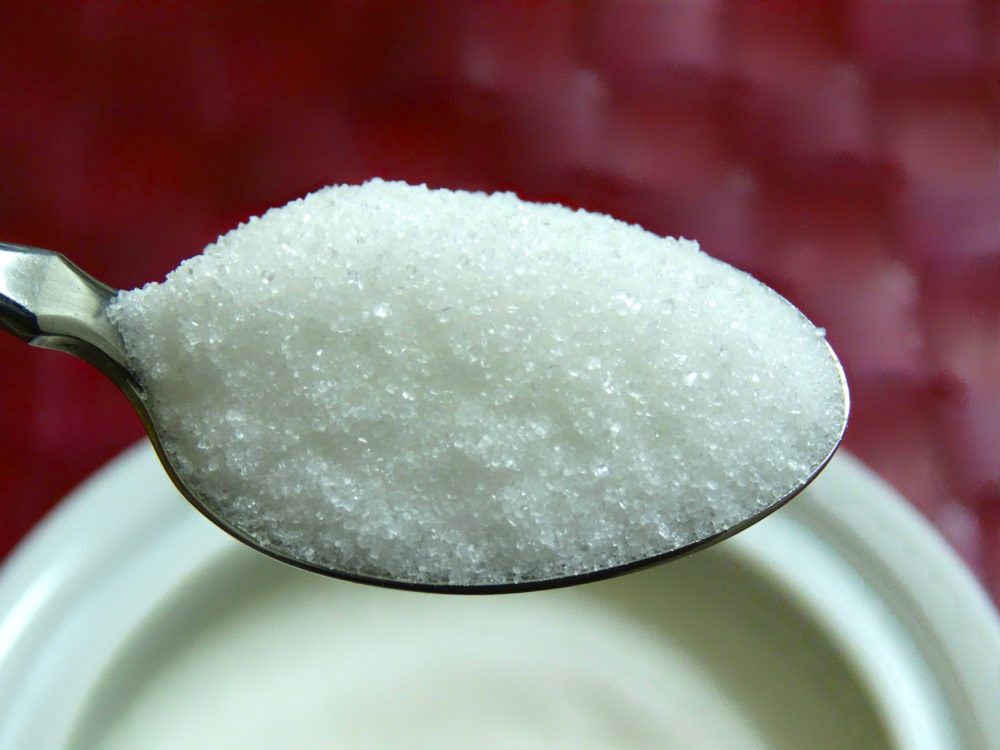I’m talking about a product that has become a pervasive household good, stocked in nearly every kitchen in the US, causing obesity, cancer, dementia, type 2 diabetes, heart disease, depression, acne, infertility and impotence.
I’m talking about sugar.
Most of us consume way too much sugar: 57 pounds of added sugar per year, according to the University of California San Francisco (UCSF). That’s almost 17 teaspoons, or more than 70 grams, per person per day! That’s compared to the 25 grams per day of naturally occurring AND added sugar recommended by the World Health Organization for a 2,000-calorie diet.
Sugar lights up our brains like a pinball machine. It hits reward centers in our limbic system, mimicking the craving, crashing, and withdrawal common with illegal drugs like cocaine and heroin. Withdrawal symptoms can include nervousness, mood changes, nausea and irritability.
In fact, sugar is eight times more addictive than cocaine, according to a 2013 study. In another study, when cocaine-addicted rats were given the choice between cocaine and sugar, they chose sugar a significant majority of the time.
“People can’t manage their behavior and their eating,” says functional medicine doctor Mark Hyman, “because their taste buds have been hijacked by processed, hyper-palatable, high glucose, high sugar foods that drive their hormones and neurotransmitters to make them eat more.”
Hyman has been researching the effects of sugar in the human body for 20 years. He says a sugar detox can take 10 days or more — three times longer than cocaine.
On my quest for emotional, physical, and spiritual purification and health over the last 18 months, I engaged in a 21-day sugar detox. I limited my sugar intake to 30 grams or less each day, and it changed my life.
My personal journey with sugar withdrawal lasted 16 days. At first, all I could think about was sugar – cookies, soda, chocolate, you name it.
I wanted it all, but I had paid my functional medicine doctor a lot of money to tell me what to do and how to do it, so I was determined to stick with the diet he recommended – even if I was irritable, angry, short-tempered, and a jerk in pretty much every way.
At this crucial point in the detox it was important to provide myself with whole food, complex carbohydrates throughout the day – steel cut oats, beans, squash or sweet potatoes – while still keeping my overall carbohydrate intake at 30% of my diet. In the event of exceptionally strong cravings I would snack on lean meats and veggies.
For at least two weeks, I carried a small cooler bag around with me everywhere I went. It was loaded with prepared healthy snacks – 2.5 ounces of mixed seeds and nuts, 6 ounces of berries, turkey jerky, chopped veggies and paleo protein bar.
If I was going to be gone longer than a few hours, I would also bring along a prepared meal. During detox from sugar I didn’t stray far from home and definitely didn’t eat out. All meals were prepared at home, by me, so I could monitor all ingredients.
By cutting out sugar, I was robbing a colony of bad bacteria of their food source. My brain’s struggle to function was actually the colony of bacteria in my gut going through is final throes of death, screaming at me to feed it in the only way it knew how.
Kelly Stucker
During the last 4 days of sugar detox my brain was having a hard time functioning. I would get up to grab something, and completely forget what I wanted or be talking and lose my train of thought mid-sentence. I knew this was the result of sugar detox, that it would soon be over and kept pushing through.
My body was screaming so loudly for sugar. Through research, I learned our guts are tied directly to our brains. By cutting out sugar, I was robbing a colony of bad bacteria of their food source. My brain’s struggle to function was actually the colony of bacteria in my gut going through its final throes of death, screaming at me to feed it in the only way it knew how.
Finally, on the 17th day, I woke up and realized it was all gone – the cravings, the terrible mood, and about 20 pounds of excess body weight. I felt lighter than air!!
That was the moment I decided I was never going back. I committed to keep my total daily sugar intake at 30 grams or less for the rest of my life. The last two weeks had, honestly, been the worst of my life. I never wanted to experience sugar dependency, cravings, or withdrawal again.
As I write this, I have succeeded in that goal, keeping my daily sugar intake below 30 grams for 18 months now. This involves more than just avoiding actual “sugar.”
I avoid wheat because flour can spike blood sugars worse than sugar itself, dairy because milk has 13 grams of naturally-occurring sugar per cup, or processed foods because of the sugar content (just look at the labels!).
What DO I eat?
A diet rich in lean meats such as turkey, chicken and fish.
A ton of healthy fats (think chia, avocado, coconut oil, nuts and seeds)
A large amount of complex carbohydrates like oats, beans, veggies, and greens.
A huge bonus I didn’t expect: sweetness. The naturally-occurring sugar in so many foods began to emerge. I began to taste sweetness I couldn’t before, because my palate and my brain had been so hyper-stimulated by the sheer amount of sugar I was consuming.
I ditched sugar, and life tastes so good.
Now, if I could only get my shopping under control …
Until next time, Coach Kelly


